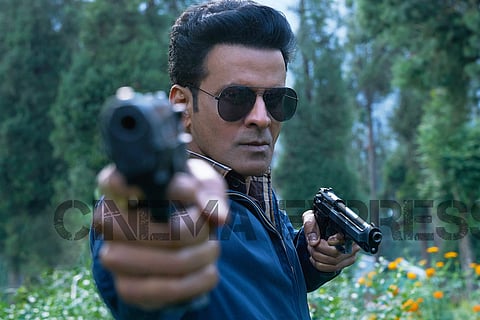

The spy-next-door has a new name: Srikant Tiwari. Played by Manoj Bajpayee, this deceptively middle-class operative pours the driest martinis. He buys vegetables at the local market, drops off his children at school, and avoids confrontations at all costs. His wife thinks he works a desk job at the National Investigation Agency. Little does she know the full extent of his résumé, which includes foiling terror attacks and undertaking tense crisis negotiations.
Such is life for the protagonist of The Family Man, Amazon Prime Video’s latest Indian original. The show, created by Raj Nidimoru and Krishna DK, pairs everyday hassles with the complex geopolitics of the Indian subcontinent. Srikant — with his shirt tucked out and his mobile phone frequently abuzz — straddles both worlds. Manoj says he was drawn to the project for its heightened realism and his character's inscrutable demeanor. “Spies are the biggest actors,” he says, “They will tell a lie no common man can catch. Srikant Tiwari, in that sense, is a difficult character. He’s somebody even the police can’t understand. At no point can they make out if he is bluffing or being truthful.”
The Family Man was filmed in Mumbai, Delhi, Kochi, Kashmir, and Ladakh. This is Manoj’s debut digital series. He is admittedly late to the game. Fellow luminaries like Nawazuddin Siddiqui and Pankaj Tripathi have already moved in on the trade. Manoj says he was holding out till the right script came his way. “Regardless of that, I must add that because of OTT platforms, genuine talent is getting consumed. It’s so disheartening to see actors who are struggling and auditioning but not getting their due. Today, as a result of the content boom, there’s a willingness among casting directors and filmmakers to reach out to people with potential.”
Manoj lists Breaking Bad, House of Cards, and Mindhunter among his all-time favourite shows. “I also can’t get over (Noah Hawley’s) Fargo. It’s something I feel somebody should make with me. I see myself in stuff like that.” The actor lauds long-form storytelling for letting him explore multiple facets of a character. “In a film, even if you work on minute nuances, the director might feel it’s unnecessary to the narrative. So he might cut it out. In a show, there’s the option of stocking it up for the next episode or season.”
Raj and DK have been making movies since 2003. Throughout their career, they have shown a knack for transplanting supposedly western genres into Indian settings. They did it with Go Goa Gone (zombie), D for Dopidi (heist), Stree (horror-comedy). With The Family Man, their maiden series venture, the duo wanted to dispel the many Hollywood clichés that surround Indian espionage. “Can you open a laptop and hack into a bank vault in India? You can’t. That was the main hook for us, to make a spy show that’s less tech-savvy and more about jugaad (ingenuity),” says Raj. Another purpose of the show, DK adds, was to explore “the inter-country relations between India and surrounding nations.”
To this end, they collaborated with writer and standup comic Suman Kumar on the script. The research included meeting former agency men and probing into India’s surveillance history. “We have picked up everything from past KGB assassinations to recent reports,” Suman says. “In a country like India, with a population of 1.3 billion people, you really can’t rely on computer surveillance. The secret, then, is Human Intelligence (HUMNIT), which is based on social engineering and interpersonal networks.”
Malayalam actor Neeraj Madhav makes his Hindi debut in The Family Man. He plays the character Moosa, a homegrown terrorist plotting against India. Neeraj was surprised when he was asked to audition for the part of a man from Kerala. “Usually in Bollywood, whenever they need a South guy, they just hire a dark-skinned actor with a fake accent. In this case, Raj and DK, and Amazon actually made an effort to hire regional actors. There’s a Kashmiri character who is played by a Kashmiri actor. Priyamani, who plays Srikant’s Tamilian wife, is from Chennai. So you will see more regional participation on the show.”
Diversity, Raj reiterates, is a key element in The Family Man. “We wanted to showcase the vibrancy of India through this format. You will hear six languages on the show, including Hindi, Telugu, Malayalam, Kashmiri, and Pashto. Unlike a film, it's the availability of subtitles on streaming sites that made such a venture possible.”